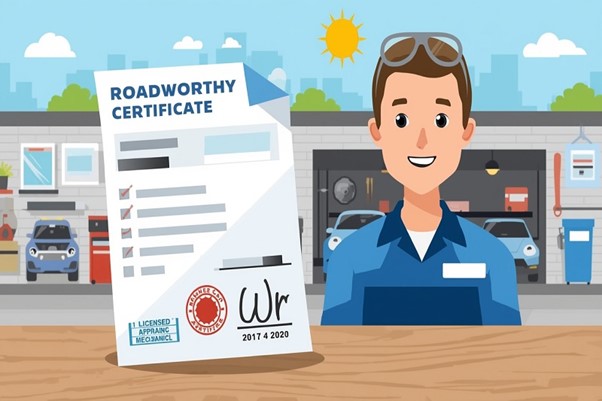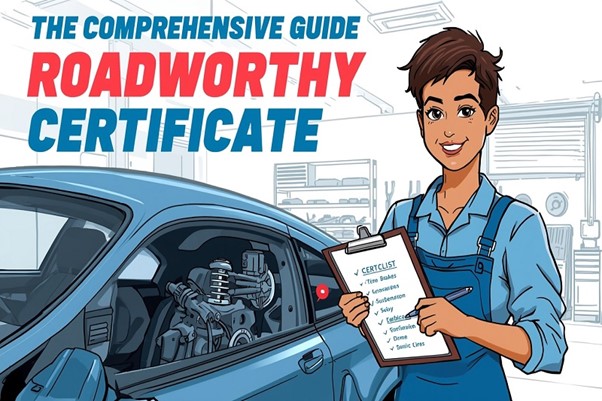Are you about to sell your vehicle and your buyer wants a roadworthy certificate? Or perhaps, are you painstakingly trying to make sense of the muddled roadworthy certification procedure? Whatever the case, getting a thorough understanding of the roadworthy certificate can seem as daunting as attempting to master a complicated recipe by a three-star Michelin chef!
However, fear not, as this comprehensive guide aims to unravel the complexities of getting your roadworthy certificate. We would demystify every bit of information – from the very essentials like what a roadworthy certificate is to specific details like who can provide one, why you might require one, and exactly when you’ll be needing it.
What is a Roadworthy Certificate?
The roadworthy certificate, akin to an examination report card, reflects the health and safety of your vehicle. It essentially affirms that your vehicle is fit and good-to-go on the road without posing any safety risks to its occupants or other users of the road.
In the broader context, the roadworthy certificate, also known as a safety certificate in certain regions, is a tool that maintains the safety standards of vehicles on the roads. It is the ‘seal of safety’ that purchasers should ask for, as it ensures that they are investing in a vehicle that is safe and sound for use on the road.
Similarly, for sellers too, this certificate earns them credibility, assuring the potential buyers of the vehicles’ condition.
Why Do You Need a Roadworthy Certificate?
Safety is the one-word answer to this question. But delving deeper, the roadworthy certificate can be a boon in several ways. To begin with, it is legally mandated in many regions to present this certificate during the transaction of a pre-owned vehicle.
Moreover, this certificate assures the buyer of the vehicle’s safety standards, making the vehicle a reliable purchase. For the seller, on the other hand, the roadworthy certificate is an apparent credibility enhancer, adding value to their offering.
Lastly, this certificate can be an important documentation requirement if you are aiming to re-register a vehicle or transferring the vehicle’s registration from one state to another.

Who Can Provide a Roadworthy Certificate?
Certified testing stations or licensed vehicle testers are primarily responsible for providing roadworthy certificates. A detailed examination of the vehicle is conducted to check its mechanics and safety features.
They generally examine components like tyres, brakes, steering, suspension, body rust or damage, windscreen, and lights, among other things.
It should be noted however, that these certificates are generally area or state specific. So, for example, a roadworthy certificate issued in Victoria would not be valid in New South Wales and vice-versa.
When Do You Need a Roadworthy Certificate?
The need for a roadworthy certificate typically arises when you’re contemplating selling your vehicle or during the process of transferring a vehicle’s registration from one name to another. Some states also require this certificate for re-registering a vehicle or when clearing a defect in it.
It’s crucial to remember that these certificates typically carry an expiry date, ranging from a few weeks to a few months, making timely execution of the transaction necessary.
Pros and Cons of Getting a Roadworthy Certificate
While the primary advantage of a roadworthy certificate is the assurance of safety it provides, there are potential downsides too. If a vehicle fails the roadworthy inspection, the owner may incur added expenses to repair the issues identified.
However, the certificate’s advantages generally outweigh its cons – providing potential buyers with confidence, establishing seller credibility, and ensuring registration transfer without legal hitches.
In Conclusion
In conclusion, obtaining a roadworthy certificate is far more than just another box to tick during the buying or selling of a vehicle—it’s a legal safeguard that ensures safety, compliance, and peace of mind. For anyone preparing their car for the market or simply wanting to ensure it meets essential safety standards, understanding the full process of securing a roadworthy certificate is essential.
If you’re based in Victoria, choosing a trusted inspection service for your roadworthy certificate Melbourne requirements can make the entire experience smoother and more transparent. From knowing when the certificate is needed to understanding the legal and mechanical checks involved, being informed helps you avoid surprises and ensures your vehicle is genuinely road ready.
Whether you’re a buyer looking for assurance or a seller aiming to present a well-maintained vehicle, remember that a certified safe vehicle isn’t just a formality—it’s your responsibility on the road. Prioritise safety, choose reputable testers, and drive forward with confidence. Safe travels!





